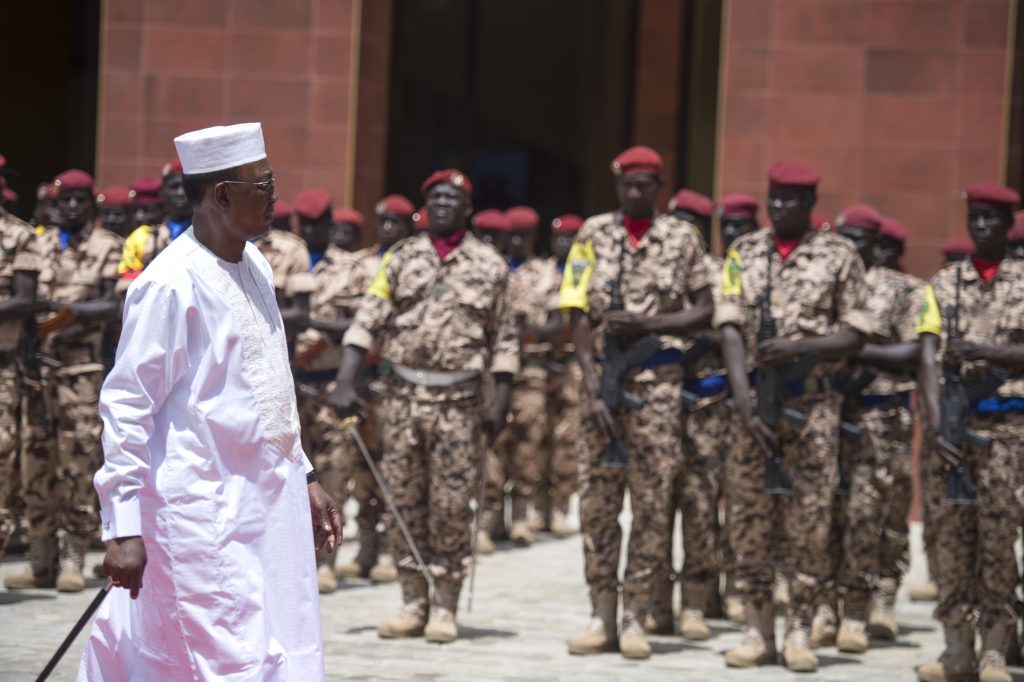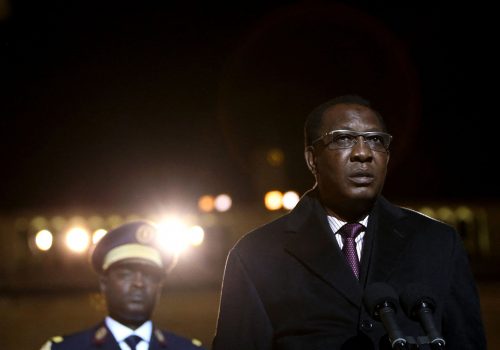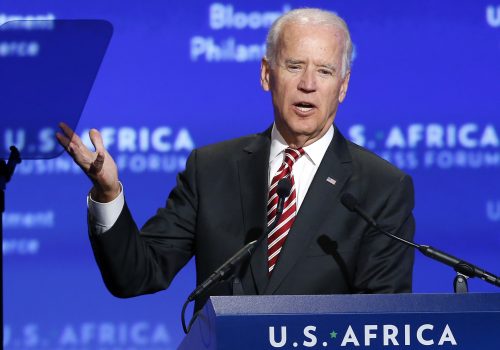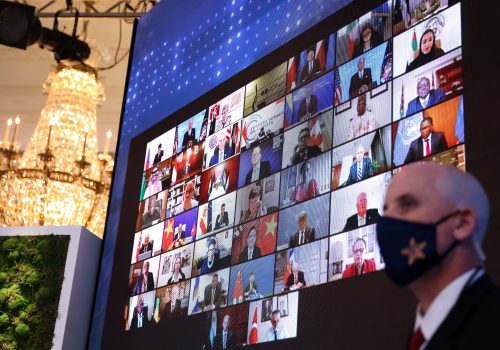The surprise death last week in Chad of long-time strongman Idriss Déby casts the country and the wider region into a period of deep uncertainty.
While perhaps of little thought to most Americans, Chad, three times the size of the state of California, sits at the crossroads of most major conflicts in Africa where the United States currently has a security interest, if not an actual operational presence.
To Chad’s east, the United States has invested heavily over the last decade in the political and humanitarian response in Darfur and more recently as part of the national transition effort in Sudan; to the north, the United States has played a leading role in ending the Libyan civil war and attempting to return a measure of stability a decade after Gaddafi’s death plunged the region into conflict; to the south, the fight against Boko Haram is the central preoccupation; while the United States has been perhaps most involved in responding to manifold threats from jihadist groups in the Sahel region to Chad‘s west, including through the establishment of a drone base, support to United Nations peacekeeping, and the deployment of special forces combat troops.
From the Mediterranean to the Gulf of Guinea and from the Red Sea to the Atlantic, all roads on these security axes run through Chad and for the past decade or more depended in no small part on the military prowess of its fallen leader, Idriss Déby.
Déby’s unique ability to respond to, manage, and in many ways shape these conflicts was a testament to both his strategic vision and his battlefield acumen. In life, and now in death, it earned him the admiration and respect of his neighbors and global powers, as reflected in the outpouring of genuine praise and mourning at his passing.
Mali, perhaps most rife with instability and dependent upon Chad’s security involvement, declared three days of national mourning for Déby, while Nigeria’s Foreign Minister cautioned that, “His demise could lead to vacuums that could implode in these subregions.” But no expression of grief was as personal and as heartfelt as from France’s President Emmanuel Macron, who said, “Chad is losing a great soldier and a President who has worked tirelessly for the security of the country and the stability of the region for three decades. France loses a courageous friend.”
Less fondly remembered is the way he managed his own country: brutally, corruptly, and vengefully; an old school African strongman who as recently as the campaign last month for his sixth term as president harassed, intimidated, jailed, and even killed his opposition opponents and their family members. He was a killer who brought order and discipline to an unstable region, but imposed fear, poverty, and misery on his own people. In his wake, he leaves a legacy of ashes, at home and across the region; and among his opponents, both real and imagined.
But his greatest personal achievement—glossed over in all the homilies and testimonials—his ability to cling to power for thirty years, was in retrospect pyrrhic for the nation he leaves behind. Chad today is little more than a collection of fractious tribal fiefdoms and hollowed out institutions, underpinned by abject poverty and a corrupt patronage system of tribal elites, all of which are exacerbated by a diffuse network of simmering rebellions that could well tear apart the meager remnants of what he left behind.
These painful facts have been known to all of Déby’s security partners across the region and beyond for years. But for so long it was easier to turn a blind eye to his domestic autocratic realities which were accepted as being in service to his significant regional security contributions. But in his death that strategy is no longer tenable, as much as some may still like it to be. And the international community’s forbearance and ignorance of the country’s unravelling is now its own to manage if it hopes to maintain any semblance of the regional order that Déby helped to impose.
France, the former colonial power, and the country whose security relations and bonhomie with Déby are in fact the most externally responsible for the country’s deleterious state, has not missed the opportunity to once again intervene, if not militarily, then behind the scenes to ensure a soft-landing for its interests. In his eulogy, speaking as Deby’s “loyal friend and ally,” President Macron warned the FACT rebels and other armed opponents that, “France will not let anybody put into question or threaten today or tomorrow Chad’s stability and integrity.”
But unlike in decades past, where Washington was content to view Chad as ‘a French problem,’ Washington’s regional security interests are today equally as bound to what unfolds in Chad. The massive US political and financial support to neighboring Sudan’s transition could easily be upended from an implosion in Chad. So too could all US efforts in rolling back the spread of jihadism from the Sahel to the Mediterranean to the Red Sea. Washington’s blood and treasure extend across the region and it can neither afford to sit out the conversation on what comes next in Chad nor subcontract its involvement to other powers with presumably more at stake. France’s parachuting in to N’Djamena last week and its early endorsement of the military transition should not constrain Washington from finding its own voice and using what influence it has to help lay the foundations for more than just a soft landing.
Indeed, in the midst of the fast-moving changes there is an opportunity to not only ensure that long-term security interests in the region are met, but to also take immediate steps to begin to address the kinds of massive democracy and development deficits that have left Chad so enervated today. It is a view that has already been espoused by the incoming Biden administration.
As Washington contemplates its next steps, there are a few actions it should prioritize:
Listen to Chadians. Under Déby, Chadian civil society was kept intentionally weak, divided, and fearful, and so observers should not expect to see the kind of organized, popular uprising that swept neighboring despot Omar al-Bashir from power in Sudan two years ago to emerge in Chad. But that does not mean Chadians lack a vision of their own future and a voice to express it.
Indeed, late last week a collection of more than five dozen Chadian political and civil society organizations released a joint statement calling for, “Respect for the constitution and the immediate establishment of a civilian transition; demand from the military a return to the constitutional order; the suspension of hostilities between the Chadian armed forces and armed groups; and the immediate opening of a national consultation with all political forces, civil society, armed groups and institutions of the Republic to initiate inclusive institutional and political reforms with a view to ensuring the stability, peace and development of Chad.”
These legitimate demands should serve as the guiding political framework for moving forward. The fact that Chad’s new military government has already rejected talk of a ceasefire and political dialogue, and is maintaining and extending Idriss Déby’s public ban on public protests, suggests that the marginal political space is about to close even further. As such, Washington’s explicit endorsement of civilian demands would not only lend legitimacy to this nascent collection of civil society actors seeking to gain their footing, but would begin to reorient years of US engagement away from Chad’s security apparatus towards an emerging civilian dispensation.
Engage the African Union. It should go without saying that in the year 2021, the former colonial power should not be picking winners and losers nor deciding the fate of the population for another generation of Chadians. There is no greater or more substantial voice that should be leading the international response to the now-coup and crisis in Chad than the principal regional organization. But while the international response should have an African face, it has been complicated in Chad by the African Union (AU) Commission’s own Chairperson, Moussa Faki Mahamat.
A Chadian and former prime minister and foreign minister under the late Chadian leader, Faki made a “private visit” to his home capital, N’Djamena, the day after Déby’s death and the installation of Déby’s son as commander of the extra-constitutional Transitional Military Council. Even in his private capacity, Faki’s presence signaled to Chadians an acknowledgment and tacit support for the illegal transfer of power in his country. For this reason, Washington ought to push privately to see him recuse himself from further direct involvement in the crisis.
Fortunately, soon after Faki’s visit, the AU’s Peace and Security Commission stepped in with a roadmap of its own, calling for Chad, “to respect the constitutional order. . . quickly engage in a process of restoration of the constitutional order and the transfer of political power to civil authorities.” The statement also alluded to the potential coercive power of AU membership suspension and economic sanctions if the constitutional order is not promptly restored. Adding to the African-led effort, the presidents of Niger and Mauritania, coalition members of the G5 Sahel Initiative, have also seemed to step into a mediating role when late last week in consultations with Chad’s political opposition they cited, “the need for a dialogue to set up transitional institutions that will be responsible for drafting a new constitution and organizing elections.” At the same time, Niger has also been asked, and agreed, to work with Chad’s new junta to hunt down and arrest fleeing FACT fighters who may be seeking refuge in Niger, further complicating the regional role to ultimately support a transition to civilian rule.
African mediators have now floated the model of the kind of civil-military power-sharing arrangement seen most recently in Mali after its latest coup and in Sudan after the popular uprising there, both of which Washington endorsed previously and worked to ensure were implemented. Endorsing this approach and committing to its success would give Washington a seat at the table and help position it on the right side of the history being written in Chad.
Put “loafers on the ground.” While statements from Washington have their place, there is no alternative to on-the-ground diplomatic engagement. Here, Washington is at a severe disadvantage compared to virtually everyone else with a stake in the outcome in Chad. One of the Trump administration’s most neglectful legacies was keeping US embassies understaffed and nowhere is this omission felt today more than in N’Djamena where the United States has been without an ambassador for nearly three years, resulting in a disadvantaged position in its use of influence to engage civilians, politicians, rebels, and military leaders alike. Even prior to this moment, so absent was US diplomacy that in the past three months of the country’s flawed presidential campaign, the US embassy did not issue a single statement of concern over its conduct or in solidarity with the beleaguered opposition as they were harassed and intimidated into submission. US credibility with and access to those negotiating for power is now no doubt severely constrained as a result of overall diplomatic absence.
But Washington can begin to make up for this neglect through the immediate reappointment of a US Special Envoy for the Sahel Region of Africa. This position, created under Trump and ably filled by my colleague Ambassador J. Peter Pham, should not only serve as a point person in ensuring that US security partners across the region are consulted and coordinated, but the envoy must now also serve as the country’s diplomatic point person inside of Chad, representing a broader set of US objectives in support of a peaceful, democratic transition. Reappointing a special envoy would reinvigorate a sclerotic diplomatic approach at the very moment it is needed most.
Act immediately; think strategically. Lastly, while the United States must move quickly to help define a framework that will avoid new violence and create the conditions for a stable transition, it would be a mistake and a missed opportunity to view developments in Chad in a vacuum. Washington should instead recognize the voluminous criticism being leveled at its ‘whack-a-mole’ securitized approach to engagement across the Sahel region to rethink and reset its agenda across the wider region. The recent successful democratic transition in neighboring Niger is a starting point. So too is recent helpful research from the likes of colleagues at the Center for Strategic and International Studies and Chatham House, among many others, all of whom argue for, inter alia, investments in human security, improved governance, a focus on state-building and service delivery, and more intentional engagement with local actors versus political and military elites. All of these are in desperate need in Chad today.
Cameron Hudson is a senior fellow at the Atlantic Council’s Africa Center. Previously he served as the chief of staff to the special envoy for Sudan and as director for African Affairs on the National Security Council in the George W. Bush administration. Follow him on Twitter @_hudsonc.
Further reading
Image: Swearing-in ceremony of President Idriss Déby Itno of Chad in August 2016. (Flickr/Paul Kagame)



